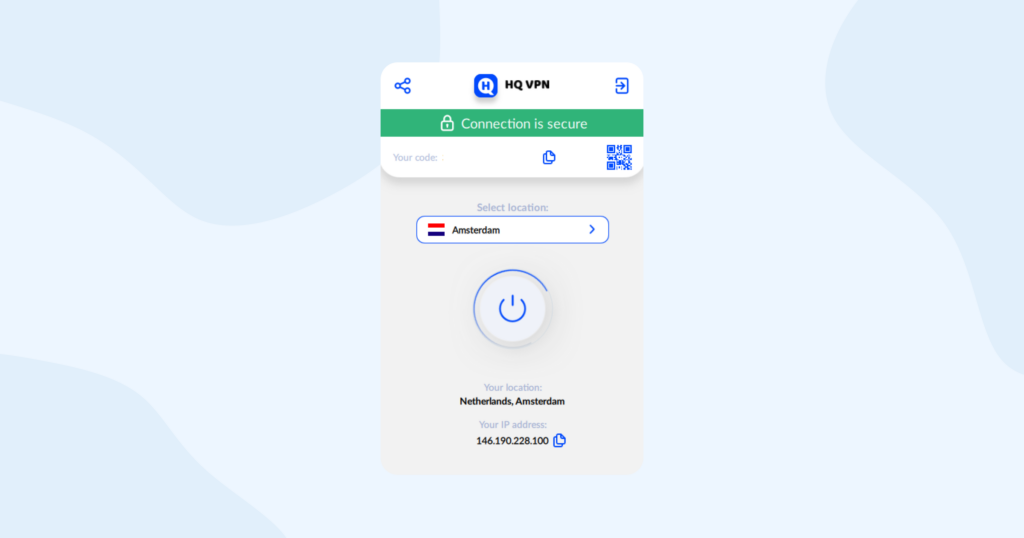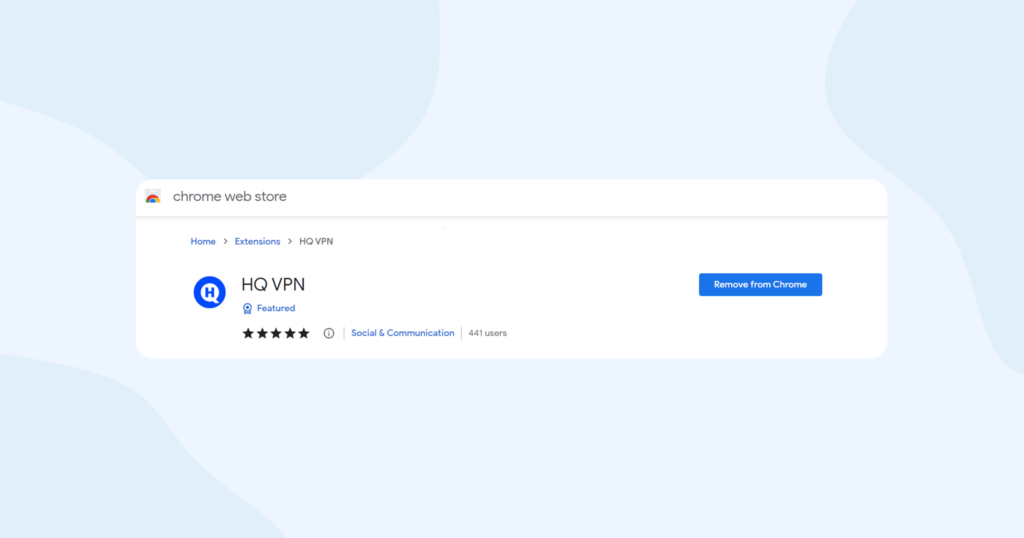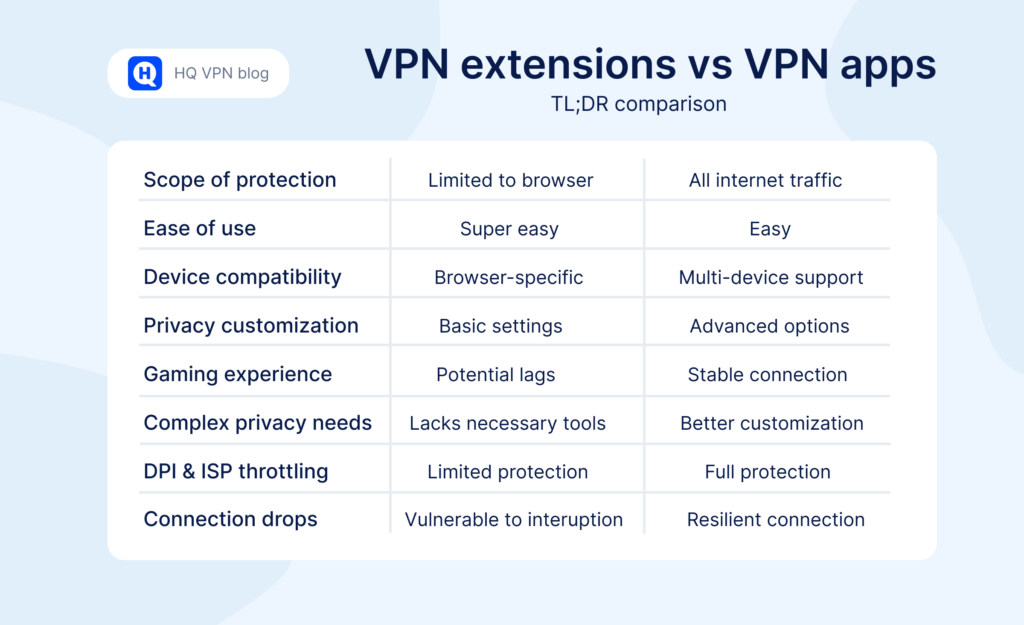

VPN Extension vs VPN App: Which Works Best for You?

In your pursuit of online security, choosing a VPN is a smart decision. But when your VPN provider offers both an app and a browser extension, you might wonder which one to pick. Is the browser extension good enough, or does it lack important features?
Let’s explore the differences to help you decide.
What is a VPN app?
A VPN app is a nifty tool designed to fortify your online security and safeguard your sensitive data and online activities.

So, what does it do? Well, a VPN app works by establishing a secure and encrypted connection between your device (be it your computer, smartphone, or tablet) and a remote server, usually hosted by your chosen VPN provider. This encrypted connection forms a virtual tunnel, which acts as a protective cloak for your internet traffic.
Why it’s so crucial?
When you connect to the internet, you’re like an open book, and anyone with the know-how can potentially peek at your online activities, including your browsing history, the websites you visit, and even sensitive information like passwords or credit card details. Not cool, right?
But, when you fire up your VPN app and connect to a server, your data travels through this secure tunnel, becoming invisible to prying eyes. It’s like your online presence goes incognito, making it nearly impossible for cyber snoops, hackers, or even your internet service provider to snoop around.
In a nutshell, a VPN app helps you achieve three main goals:
- Security. It shields your online data from potential threats, keeping it safe and sound.
- Privacy. It keeps your online activities confidential, so your browsing habits remain your business and yours alone.
- Access. It allows you to access region-restricted content and websites by making it seem like you’re connecting from a different location.
Think of it as your digital bodyguard, ensuring you can explore the online world with peace of mind. But, remember, it’s only half of the story. There’s also the VPN browser extension, which we’ll delve into next.
What is a VPN browser extension?
So, what exactly is a VPN browser extension, and what’s its deal? Think of it as a mini version of a full-blown VPN app, tailor-made for your web browser. It’s a lightweight add-on, usually available for popular browsers like Chrome, Firefox, or Edge.

The main job of a VPN browser extension is to provide a quick and easy way to encrypt your internet connection and shield your online activities, all without the need for a separate application. Once installed and activated, it works its magic as you browse the web, offering pretty much the same benefits as a VPN app.
These extensions are especially handy for quick, on-the-go privacy and security. Need to check your email from a public Wi-Fi network? Concerned about website trackers following your every move? A VPN browser extension can come to the rescue.
However, it’s worth noting that browser extensions may not offer the same level of security and features as a full-fledged VPN app.
VPN browser extension vs VPN app: what is the difference?
So, let’s get down to the nitty-gritty and tackle the question on everyone’s mind: What’s the real difference between a VPN browser extension and a full-blown VPN app? It’s a vital distinction to grasp, as it can make or break your online security and browsing experience.
Scope of protection
The first and perhaps most significant difference lies in the coverage. A VPN app is like a fortress surrounding your entire digital world. When you fire it up, it encrypts all the internet traffic coming from your device. That means every application, service, and process on your computer or mobile device is shielded.
On the flip side, a VPN browser extension is more like a gatekeeper for your web browser. It encrypts only the data passing to and from your browser, leaving the rest of your online activities untouched. If you want to secure your email, torrenting, or any other application outside of your browser, you’ll need the app.
Simplicity vs. versatility
VPN browser extensions win the ease-of-use contest. They’re usually straightforward to install and activate, making them perfect for quick security boosts when you’re surfing the web. You just click a button, and you’re shielded.
On the other hand, VPN apps are the Swiss Army knives of online security. They offer a wider range of features, including the ability to choose from various servers, protocols, and settings. If you need versatility and control, the app is your go-to tool.
Privacy and anonymity
Both options provide a degree of anonymity by masking your IP address, but the VPN app often does it better. It routes all your device’s traffic through a remote server, making it appear as though your device is in a different location. A VPN browser extension, while still hiding your IP, only does so for your browser activities.
Device compatibility
VPN apps usually support a broader range of devices, including computers, smartphones, and even routers. Browser extensions, as the name implies, are primarily designed for web browsers. So, if you want to secure multiple devices or protect your entire home network, an app is the better choice.
Security level
In terms of security, VPN apps tend to provide more robust protection, as they encrypt all your device’s traffic. Browser extensions, while secure for web browsing, leave other apps and services potentially exposed.
In summary, the choice between a VPN browser extension and a VPN app comes down to your specific needs and priorities.
If you value simplicity and don’t require full-device encryption, a browser extension is a great choice. However, if you’re seeking comprehensive security, more device compatibility, and fine-grained control, the VPN app is your best bet.
Potential drawbacks of a VPN extension
While VPN browser extensions are handy for many online security and privacy needs, they’re not the ultimate solution for everything.
Let’s look into common problems that a VPN extension simply can’t solve.
1. Limited network coverage
Imagine you have a VPN extension installed in your web browser, but you also have other applications running on your computer that connect to the internet, like email clients, torrenting software, or video streaming apps.
A VPN extension can’t shield these applications. It only encrypts the traffic within your web browser. So, if your goal is to protect your entire device, you’d need a VPN app for comprehensive coverage.
2. Potential connection lags
Online gaming often requires a stable and low-latency connection. While a VPN extension can encrypt your browser’s traffic, it might not be suitable for online gaming. The additional layer of encryption and routing through a remote server can introduce lag, making your gaming experience less enjoyable.
If gaming is a priority, a VPN app with a gaming-optimized server might be a better choice.
3. Device compatibility
VPN extensions are browser-specific. They work well for web browsing but won’t protect other applications on your device. If you want to secure all your online activities across different devices, you’ll need a VPN app that supports a broader range of platforms, including computers, smartphones, and even routers.
4. Complex privacy requirements
For advanced privacy needs, such as avoiding DNS leaks, configuring kill switches, or using advanced encryption protocols, a VPN extension might not have the necessary settings. VPN apps typically offer more customization options and advanced security features to meet these requirements.
5. Deep packet inspection and ISP throttling
Some internet service providers employ deep packet inspection (DPI) to analyze and throttle certain types of internet traffic, like torrenting or video streaming. While a VPN can help evade such practices, not all VPN extensions are capable of bypassing DPI. A VPN app, with more robust encryption and obfuscation techniques, can provide better protection in such cases.
6. Connection drops
VPN extensions can sometimes suffer from connection drops, especially if you switch between Wi-Fi networks or experience brief internet interruptions. When this happens, your browser traffic might temporarily go unprotected, potentially exposing your data. VPN apps are generally more resilient in maintaining a secure connection.
TL;DR
The choice between a VPN browser extension and a full-blown VPN app can be a bit like selecting the right tool for the job. Each has its strengths and limitations, and understanding these distinctions is essential for ensuring your online security and privacy align with your needs.

Here are the key takeaways to help you make an informed decision:
- VPN browser extensions offer quick and convenient browser-level protection. They are user-friendly, great for on-the-go privacy, and suitable for basic web browsing needs. However, they might not cover all your online activities, and they can’t match the versatility of VPN apps.
- Dedicated VPN apps are your comprehensive security solution. They encrypt all internet traffic on your device, providing a higher level of protection. They offer more customization options, support multiple devices, and are ideal for users with complex privacy requirements, including bypassing deep packet inspection and ISP throttling.
Remember, the goal is to strike the right balance between convenience and comprehensive protection. Make your choice wisely, and you’ll have your online security and privacy well in hand.
And, if you’re looking to take your browsing experience to the next level, don’t forget to check out our compilation of the best adblockers in 2023.



